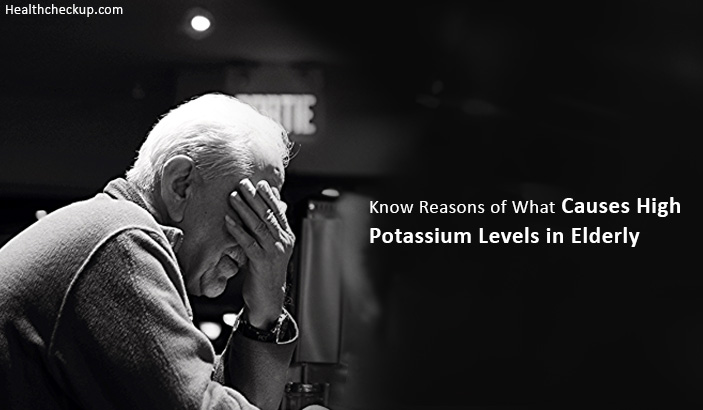The electrolyte issue Hyperkalemia, or High Potassium, is a genuine and conceivably perilous condition. The kidneys, with the assistance of the hormones renin and aldosterone, maintain the balance of potassium in the body. As individuals age, the kidneys turn out to be less effective because of loss of kidney mass and decreased blood flow. The elderly are more inclined to hyperkalemia because of these age related kidney changes notwithstanding medicinal conditions more typical in older people. One must be aware of high potassium levels in the elderly causes.
What Causes High Potassium Levels in Elderly?
Diabetes
The BC Endocrine Research Foundation takes note that roughly 20 percent of individuals over age 65 will have diabetes sooner or later in their life. Diabetes, is associated with the age-related diminishing in kidney function, can prompt a condition called Hyporeninemic Hypoaldosteronism, as per the article “Hyperkalemia in the Elderly” distributed in 1997 in the Journal of General Internal Medicine. This condition happens when there is an interruption in the discharge of the hormone renin, prompting elevated amounts of potassium in the blood.
[Learn More About – Best Indian Snacks For Diabetes]
Changed Kidney Function
The ordinary maturing process normally results in changed kidney function. As bloodstream to the kidneys diminishes, the kidneys’ capacity to channel the blood likewise diminishes. As a result, the process of removing potassium reduces, and causes lead to higher accumulation of potassium in the blood. The problem of removing potassium gets even worse in case the patient suffers kidney problems.
Medicines
Certain medicines may be in charge of the advancement of high potassium levels. For instance, a few diuretics interfere with the kidneys’ capacity to discharge potassium. These potassium-saving diuretics incorporate spironolactone, triamterene, and amiloride. Nonsteroidal mitigating drugs, similar to headache medicine and ibuprofen, additionally meddle with the body’s capacity to expel overabundance potassium from the circulation system.
Some medicines like angiotensin are high in potassium levels work. These medicines have converting enzyme inhibitors, beta-adrenergic blockers, heparin and high doses of digoxin which make the accumulation of potassium easier. These medicines further are the major causes of kidney failures.
Overabundance Dietary Potassium Intake
High-potassium nourishments are frequently basic segments of an elderly individual’s normal eating regimen. Though the milk is a primary source of calcium, yet in addition, it gives a lot of potassium. For elderly with dental issues, high-potassium yoghurt, bubbled potatoes, tomatoes, and bananas are delicate and simple to eat.
Numerous more established individuals additionally go after prunes or raisins – which are likewise high in potassium – to direct stomach related capacity. Extra dietary wellsprings of potassium incorporate meat, angle, broccoli, lima beans, and citrus foods grown from the ground.
Utilizing Salt Substitutes
Respective of salt substitutes making a great contribution towards lowering blood sodium levels, but many of these substitutes are responsible for the accumulation of blood potassium levels. Potassium chloride has a taste similar to sodium chloride, which makes it an ideal option to use as a table salt. And keeping in mind that these additional measurements of potassium probably won’t be risky for the vast majority. It very well may be negative to individuals who can’t discharge potassium legitimately. Individuals with hindered kidney capacity or kidney ailment, or individuals taking the prescriptions beforehand talked about ought to counsel a doctor before utilizing potassium chloride salt substitutes.
Taking Supplements
To diminish the danger of low potassium levels, numerous elderly individuals are told to build dietary admission of potassium as well as to take potassium supplements. And keeping in mind that the two recommendations may be useful, it can really prompt perilously large amounts of potassium in the blood if an excessive amount of is expended. Counsel your doctor before taking supplements of any kind – potassium or something else.
How To Reduce High Potassium Levels?
The normal objective of treatment for high potassium levels is to enable your body to dispose of the abundance potassium rapidly and to settle your heart.
Hemodialysis
In the event that you have high potassium because of kidney disappointment, hemodialysis is your best treatment choice. Hemodialysis utilizes a machine to expel squander from your blood, including abundance potassium, when your kidneys can’t channel your blood successfully.
[Learn More About Natural Ways To Increase Kidney Function Than Dialysis]
Medication
Your specialist may likewise recommend medications to treat your high potassium levels. These may include
Calcium Gluconate: Calcium gluconate can help decrease the impact that potassium has on your heart until the point that high potassium levels are settled.
Diuretics: Your specialist may likewise recommend diuretics, which are pills that reason you to urinate more. A few diuretics increment the measure of potassium discharged by the kidneys while different diuretics don’t expand potassium discharge. Contingent upon your potassium level, your specialist may suggest at least one of the accompanying kinds of diuretics
- Circle Diuretics
- Potassium Saving Diuretics
- Thiazide Diuretics
Each kind of diuretic focuses on an alternate piece of the kidneys.
Resin: The process includes taking oral medicine which gets intact with the potassium and is removed during the process of excretion.
Foods that Lower Potassium Levels
Limiting foods and supplements that are high in potassium can help reduce the potassium levels in the body. Some food items which can help are
- Bananas
- Nuts
- Beans
- Milk
- Potatoes
- Apricots
- Cod
- Beef
High Potassium Levels Risk For Cancer Patients
Cancer patients confront extra hazard factors for hyperkalemia, in spite of the fact that kidney issues still normally assume a part. Reactions of chemotherapy, the breakdown of tumor cells, hormones created by specific sorts of tumors. And broad substitution of the adrenal organs by tumors would all be able to result in high potassium blood levels. As indicated by the “Manual of Clinical Oncology.”
What’s more, high white platelet or blood platelet tallies can cause a fake increment in potassium in a test after the blood is drawn. This “pseudohyperkalemia” must be isolated from genuine hyperkalemia happening in the body.
Just knowing what causes high potassium levels in the elderly is not enough. One needs to take measures to reduce the same as it can have a life threatening impact on the human body.
Medically Reviewed By








